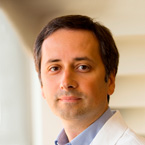
Dr. Velculescu is Co-Director of Cancer Biology and Professor of Oncology and Pathology at the Johns Hopkins University Kimmel Cancer Center. He is internationally known for his genomic discoveries in human cancer. Dr. Velculescu developed SAGE (serial analysis of gene expression) and used this method to perform the first transcriptome analysis in eukaryotic cells. Subsequently, he developed Digital Karyotyping for analysis of structural genomic alterations and together with his colleagues performed the first sequence analysis of the coding genome in human cancers, including breast, colorectal, brain, pancreatic, and ovarian cancers. These analyses identified a variety of genes not previously known to be involved in neoplasia, including PIK3CA gene as one of the most highly mutated genes in human cancer. More recently, his group has developed PARE (personalized analysis of rearranged ends) for non-invasive liquid biopsy approaches for tumor detection and monitoring. These discoveries provide insights into the mechanistic features and pathways underlying human cancer and provide new opportunities for individualized diagnostic and therapeutic approaches.
Dr. Velculescu completed his B.S. at Stanford University and his MD, PhD, and postdoctoral fellowship in Oncology at Johns Hopkins University. Dr. Velculescu is a member of the Board of Directors of AACR, has served as a member of scientific advisory boards of Basser Research Center at University of Pennsylvania, the Starr Cancer Consortium, Quintiles, Helicos Biosciences, Inostics, and SoftGenetics, and is a co-founder of Personal Genome Diagnostics. He is the recipient of several awards for his work including the Grand Prize Winner of the Amersham/Pharmacia & Science Young Scientist Prize (1999), Judson Daland Prize of the American Philosophical Society (2008), the European Association of Cancer Research and Carcinogenesis Young Investigator Award (2008), the AACR Award for Outstanding Achievement in Cancer Research (2009), the Paul Marks Prize for Cancer Research (2011), and the AACR Team Science Awards for Pancreatic (2013) and Brain Cancer Research (2014).